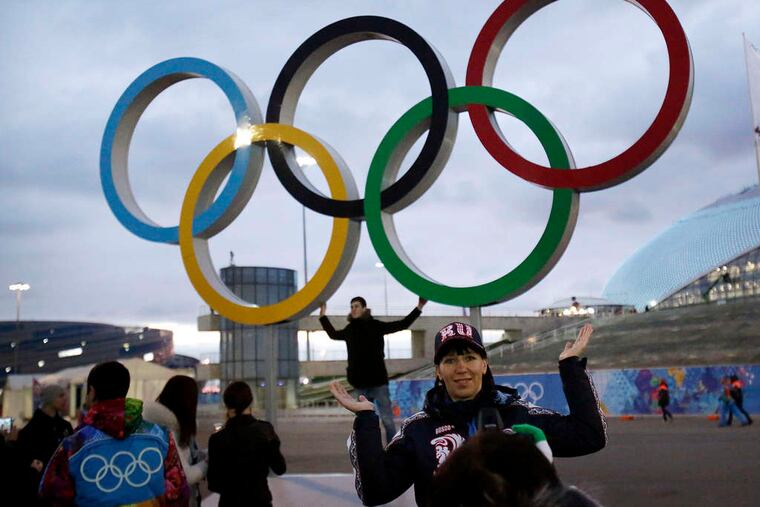Johnny Quinn: Behind closed doors
SOCHI - American bobsledder Johnny Quinn may have claustrophobia by the time these Olympics are over. Quinn, 30, who made headlines last week by breaking down his stuck bathroom door in the Olympic Village, said Monday that he and some compatriots were trapped in an elevator.

SOCHI - American bobsledder Johnny Quinn may have claustrophobia by the time these Olympics are over.
Quinn, 30, who made headlines last week by breaking down his stuck bathroom door in the Olympic Village, said Monday that he and some compatriots were trapped in an elevator.
Quinn, a former NFL player, is competing in the two- and four-man bobsled events. Three days ago, his bathroom door wouldn't open after he took a shower, and "with no phone to call for help, I used my bobsled push training to break out," he said on Twitter.
Monday, he posted pictures of the inside of an elevator, saying he was stuck with teammate Nick Cunningham.
"No one is going to believe this, but we just got stuck in an elevator," he wrote on Twitter.
Russian protest
Russia appealed a jury's decision to let a Norwegian skier keep his bronze medal even though he impeded Maxim Vylegzhanin in the final sprint.
The International Ski Federation said it received the Russian appeal on Monday and has 72 hours to make a ruling. However, FIS spokesman Michal Lamplot said the case is likely to be dealt with quicker, since "everyone is waiting for this decision."
Martin Johnsrud Sundby won the bronze after beating Vylegzhanin by 0.1 seconds. However, he clearly crossed into his Russian rival's lane a few meters before the finish line, and the host team claimed that unfairly impeded Vylegzhanin.
From ice to TV booth
The man responsible for one of short-track speedskating's enduring memories is back at the Olympics.
Steven Bradbury of Australia is working as a TV commentator and mentor to his country's two short-track skaters competing in Sochi.
Now 40, Bradbury is best known for his victory in the 1,000 meters in the 2002 Salt Lake City Games. He won after all four of his rivals, including American Apolo Anton Ohno, crashed in the final turn. A shocked Bradbury skated across the finish line, his arms thrown up in disbelief at winning Australia's first winter gold medal.
"Everyone knows that I was lucky," he said. "But it doesn't change the fact that I worked five hours a day, six days a week for 12 years to get lucky."
Motivated seat-fillers
Organizers of the Sochi Games confirmed that they are using volunteers to fill the seats at less-popular events.
Competitions at the Games have so far varied from sell-outs at the ice-skating team event Sunday to half-empty stands at biathlon.
Alexandra Kosterina, a spokeswoman for the Sochi organizing committee, said volunteers are enrolled in a motivation program, which means some of them will be offered tickets to see competitions after hours.
No displays of grief
The International Olympic Committee is reprimanding athletes for wearing items commemorating the dead.
IOC spokesman Mark Adams said the Olympic body sent a letter to the Norwegian Olympic Committee after its female cross-country skiers wore black armbands Saturday in honor of a teammate's brother, who died on the eve of the Games.
The IOC banned helmet stickers in tribute to the late Canadian skier Sarah Burke. Adams said athletes should find "a better place" to express their grief.